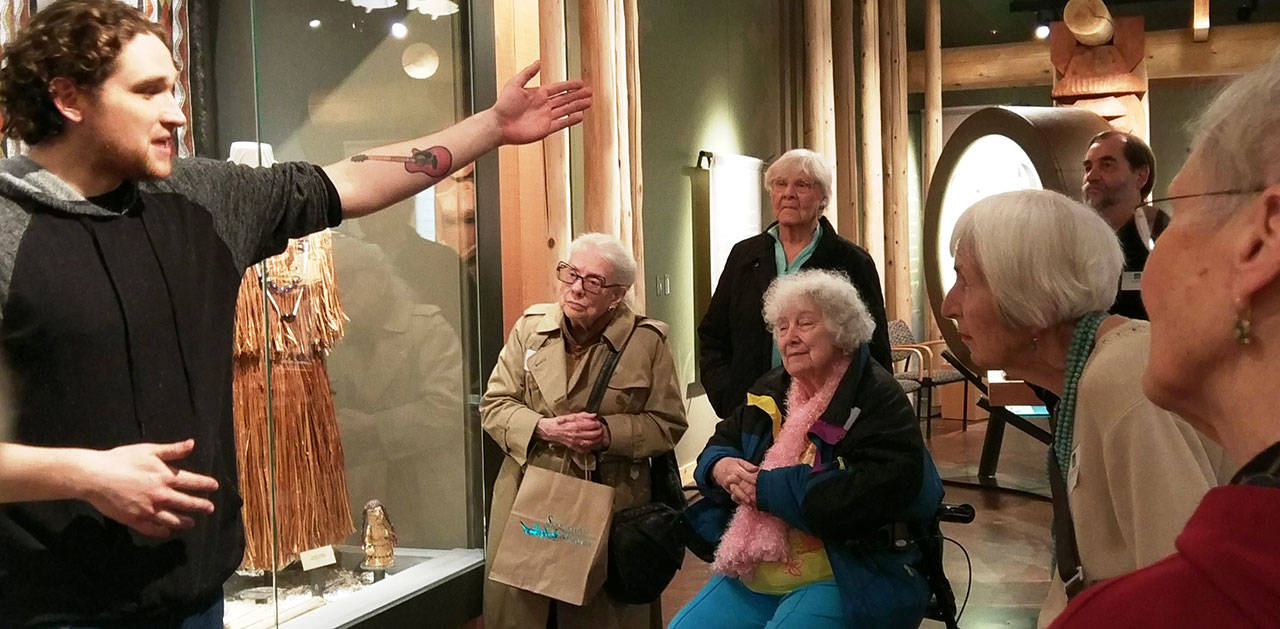When worsening vision forced islander Jean Hennessy to stop driving, she didn’t anticipate she would soon gain “a whole stack of new friends.”
They were the volunteers sent by Island Volunteer Caregivers (IVC) to make sure she got to her appointments — and to fun social events too, if she wanted.
The independent Hennessy had a life-long habit of volunteering herself. She had even helped a neighbor through IVC, but as she said, “It’s so much easier to give than to ask for help.”
IVC executive director Rita Elsberry helped her reflect on the joy volunteering had brought her. Now, it was time to allow someone else the same rewards. It’s the reciprocal model of community-building that island-grown IVC has followed for more than 20 years. It’s a structured way for caring community members to reach out to vulnerable neighbors with unmet needs.
IVC has three paid staff members to keep the organization running, but it is trained volunteers (now nearly 250) who actually provide its services to some 325 registered and screened care receivers. There is never a charge. With the number of new care receivers growing year over year at 10 to 15 percent, more volunteers are always needed and always welcomed.
Every week IVC handles 20 to 30 requests for help, a jump of 100 percent since 2016. Most requests are for everyday neighborly tasks that help make a dignified, socially connected life possible despite advancing age or disability.
A few are for specialized tasks like medical note taking when a trained volunteer goes with patients to take notes while they see their doctors. But most are not.
Volunteers, or “caregivers,” are not licensed personnel and do no hands-on work. They are just regular island residents, nearly equally male and female, whose hearts are open. Sometimes they say with tears in their eyes that they volunteer because they live too far away to help their own family members, and they just hope someone else is volunteering for their loved ones.
Most often, people ask for rides to medical appointments or to go shopping. Volunteers may also carry out trash cans, do a quick vacuum, make a meal for someone newly back from the hospital, go for a long drive, or simply chat or stroll with a person whose life has narrowed down.
Volunteers learn of the needs through a daily e-mail from program manager Robin Gaphni, “picking up” any request depends entirely on volunteer choice, with no minimum or regular commitment required.
Beyond these basics, a new avenue of for volunteering has opened through IVC’s Life Enrichment program, coordinated by Lynn Murphy.
Loneliness and social isolation are the enemies. New care receivers are asked their interests, and if they wish they may be hooked up with groups that might travel with volunteers to the movies or BPA, go shopping in Silverdale, scope out a museum exhibition, attend a music appreciation group or, in fine weather, walk with the Kreaky Knees.
“It’s not the activity that’s most important,” Murphy said, “It’s the companionship. People just start talking and laughing when they get together with their peers.”
Through a Kitsap Transit program, IVC has use of a van, nicknamed VanGo. VanGo makes many of these trips possible. If additional people volunteer to train as drivers, the outings could be more frequent. Murphy guarantees the training process is easy and the rewards many.
IVC has expanded its core services to include several other programs. Every summer hundreds of bouquets are made from flowers donated by the public and then delivered to the homebound.
Similarly, this Valentine’s, hundreds of large homemade cookie hearts were also delivered in a single day to care receivers. The trained therapy dog Jack and his person are available to visit people who might be missing furry friends. A thriving Caregivers Support Group meets weekly for people taking care of loved ones.
There’s grief support through two different services.
One is Compassionate Companions, which offers one-to-one peer support by volunteers trained to offer nonjudgmental empathetic listening and presence.
The other is Grief Support Group, run twice yearly. Gaphni is the contact for people grieving the loss of a loved one who desire guidance and support to move through their grief and heal.
In a few weeks, IVC will be moving into new and larger offices on Finch Place. To learn more about its myriad services or to volunteer, go to the website IVCBainbridge.org or call the office at 206-842-4441.
Reflecting on the many phases of her life, Jean Hennessy summed it up best, for both volunteers and care receivers: “Sometimes it’s difficult, but who said life is always perfect? People just need other people in their lives.”
Susan Bottles is a past Island Volunteer Caregivers board president and current volunteer.



